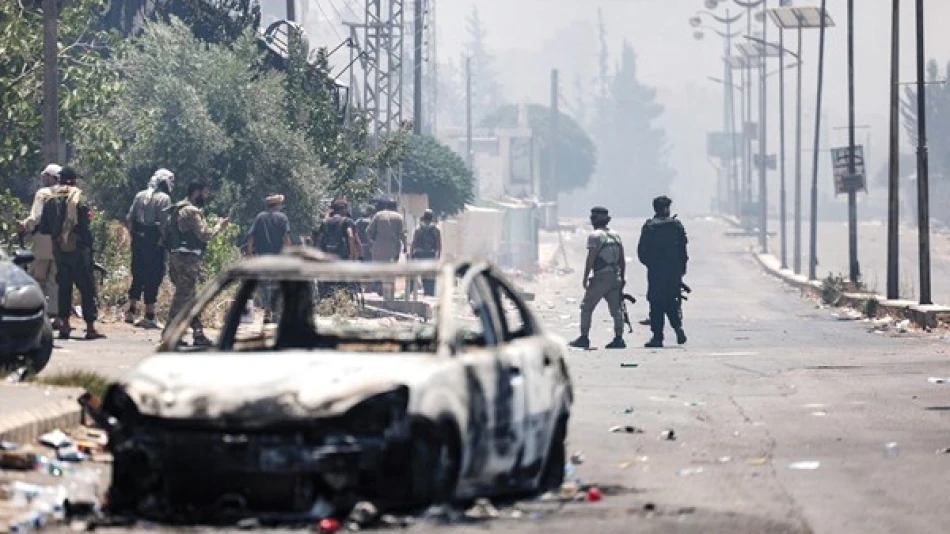
Renewed Push for Ceasefire in Sweida, Syria Amidst Intense Efforts
Syria's Druze Heartland Becomes New Flashpoint as Tribal Forces Challenge Damascus Authority
Syria's southern Sweida province has erupted into armed confrontations between tribal militias and government forces, forcing Damascus to declare an immediate ceasefire while tribal fighters maintain control over most neighborhoods in the provincial capital. The crisis exposes deep fractures in Syria's post-conflict governance and highlights the challenge of extending state authority over communities that helped sustain the country through 13 years of war.
Tribal Forces Reject Security Deployment Despite Ceasefire
Despite a comprehensive ceasefire announced by the Syrian presidency, tribal forces have refused to withdraw from strategic positions across Sweida city. The militias now control key districts including Al-Masakin, Ain al-Zaman, Al-Thawra, and areas around the national hospital, according to sources from the Syrian Tribes and Clans Council.
The standoff reflects a fundamental disagreement over implementation of a dawn agreement that would have seen government security forces deployed throughout the province. "We are committed to the Syrian government's agreement, but we will not withdraw from our positions until public security forces are deployed throughout Sweida province," a tribal council source stated.
Humanitarian Crisis Deepens
The confrontation has created severe humanitarian conditions, with water, electricity, and basic services cut off due to curfews and what residents describe as a siege. Local civilians have appealed for humanitarian corridors to evacuate non-combatants from the city center.
Damascus Struggles to Assert Control in Loyalist Region
The Sweida crisis represents a particularly sensitive challenge for Syria's government. The Druze-majority province largely avoided the worst violence of Syria's civil war and maintained nominal loyalty to Damascus throughout the conflict. However, the current confrontation suggests that even traditionally supportive communities are now questioning the terms of their relationship with central authority.
President Assad's government has found itself in the unusual position of negotiating with armed groups that were previously considered allies rather than opponents. The Syrian presidency's warning that ceasefire violations constitute "a clear breach of national sovereignty" indicates Damascus views the tribal challenge as a direct threat to state legitimacy.
Regional Powers Rally Behind Syrian Government
The crisis has prompted unprecedented diplomatic coordination between Jordan, the United States, and Syria. Foreign ministers from Jordan and Syria met with U.S. Special Envoy to Syria Thomas Brac in trilateral talks aimed at stabilizing the situation—a rare instance of direct U.S.-Syrian diplomatic engagement.
Both Jordan and the United States have explicitly backed the Syrian government's ceasefire efforts, reflecting regional concerns that instability in southern Syria could spill across borders. Jordan's position is particularly significant given its hosting of Syrian refugees and its economic interests in eventual Syrian reconstruction.
European Union Calls for Inclusive Transition
The European Union has used the crisis to renew calls for broader political reform, stating that "the time has come for dialogue and moving forward with a truly inclusive transition." The EU's statement notably called on Israel and other external actors to respect Syrian sovereignty—a reference to ongoing Israeli military operations in southern Syria.
Implications for Syria's Post-Conflict Order
The Sweida confrontation reveals the fragility of Syria's apparent stability after years of conflict. While Damascus has regained control over most territory, the current crisis demonstrates that local communities retain significant leverage over the terms of central government authority.
For regional investors and governments planning post-conflict engagement with Syria, the Sweida crisis serves as a reminder that Syrian reconstruction will require navigating complex local power structures rather than simply dealing with Damascus. The tribal militias' ability to effectively challenge government forces in a previously stable region suggests similar dynamics could emerge elsewhere.
The international community's swift diplomatic response also indicates that regional powers view Syrian stability as critical to broader Middle Eastern security—making resolution of local conflicts like Sweida a priority for maintaining the fragile post-conflict equilibrium across the Levant.
Most Viewed News

 Layla Al Mansoori
Layla Al Mansoori






